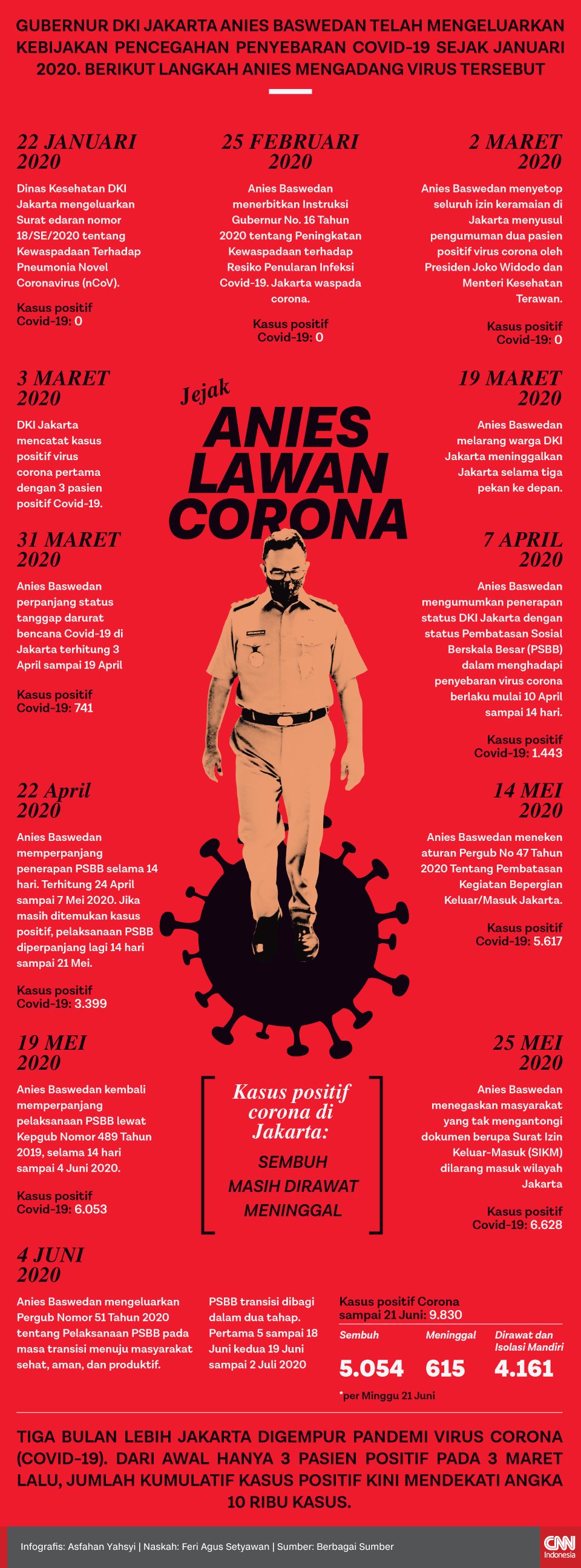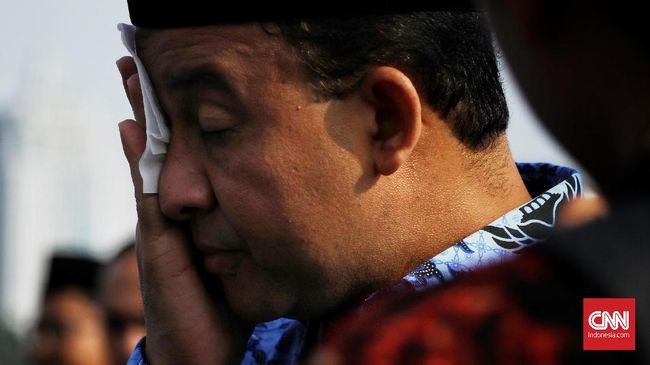Jakarta, CNN Indonesia –
Governor of DKI Jakarta Policy Anies Baswedan reimposing Large-Scale Social Restrictions (PSBB) is rated as panic policy or policies decided in the midst of a pandemic panic covid-19.
Trisakti University public policy observer Trubus Rahadiansyah stated that Anies was confused about the increasingly uncontrollable spread of the corona virus (covid-19) in the capital.
“In my opinion, Pak Anies’ policy is confused. panic policy in fact. Faced with the condition of an increase in the number of cases, epidemiologically the exposure to Covid is very high, “said Trubus when contacted. CNNIndonesia.com, Friday (11/9).
The addition of positive daily cases in Jakarta is known to continue to increase. Since early September, positive cases have increased to 1,000 cases every day.
Positive cases of Covid-19 in DKI as of Friday (11/9) are known to have reached 51,635, with 39,128 recovered and 1,368 died.
Anies also chose to re-implement the PSBB considering the pandemic conditions in Jakarta that have not improved. The former Minister of Education and Culture projects that the referral hospital in Jakarta will not be able to survive until 17 September 2020.
Epidemiologically, said Trubus, the handling of covid-19 in Jakarta is actually better than other areas. This is evidenced by Jakarta’s ability to test according to World Health Organization (WHO) standards.
From Anies’ claim last August, DKI was able to carry out 11 thousand specimen tests per day with a network of 54 laboratories.
|
– – |
However, the re-implementation of the total PSBB, according to Trubus, does not guarantee control of the spread of the virus because the number of test capacities in Jakarta has increased drastically.
According to him, the implementation of the first PSBB was successful because the test capacity in Jakarta was still low. This time, Trubus predicts the implementation of the total PSBB will not change the situation much.
“When I wanted to implement this PSBB, it looked like romanticization, delusions, hallucinations,” said Trubus.
“In the past, the first PSBB transmission was small, not because it was slightly contagious, because at that time the testing was also minimal, the tools were still minimal, so the impression that appeared was that,” he added.
Currently, Anies should continue to carry out the transitional PSBB with supervision and enforcement of regulations as well as improving health protocols.
The reason is, Trubus sees that the supervision and enforcement of regulations have not run optimally during the implementation of the transitional PSBB. In fact, DKI has a number of legal products that support this implementation.
This is stated in Governor Regulation Number 41 of 2020 concerning Imposition of Sanctions for Violations of PSBB Implementation which regulates fines of IDR 250 thousand for residents who do not wear masks.
“In fact, the Governor Regulation number 79 was issued again, regarding progressive fines. I think that is what is applied, in addition to other policies that follow,” he said.
He also suggested that DKI implement community-scale social restrictions at the RT or RW level which are included in the red zone category for the spread of covid. According to him, this would be more effective than implementing the PSBB in all areas of Jakarta.
“That is actually more effective than imposing all over Jakarta because all of Jakarta will have an impact on economic problems,” he said.
Trubus predicts that Anies will find it difficult because he experiences resistance over the re-implementation of the PSBB. This is because many residents are more concerned with their daily needs than the problem of the spread of covid-19.
“There is no guarantee that the community will not give up because basic needs must be met, it cannot be postponed. People will be desperate to ignore all of it. They will not care about PSBB,” he concluded.
 – –– |
A different opinion was conveyed by University of Indonesia epidemiologist Tri Yunis Miko. According to him, the re-implementation of the total PSBB in DKI was effective in reducing cases of Covid-19.
It’s just that the implementation of this PSBB must be done strictly to prevent crowds.
“The main factor is the crowd, if this PSBB can prevent crowds, then this PSBB is effective at preventing transmission,” he said.
He suggested that restrictions be put in place in places with a high potential for crowds such as offices and shopping centers to avoid transmission.
The community must also remain disciplined in implementing health protocols both outside and inside the home. This is because the crowd also has the potential to appear inside the house during the implementation of the PSBB.
“This PSBB eliminates crowds in DKI through closed offices, closed malls, automatically no crowds, no transmission. Now, the crowd has moved to their homes, so it really depends on people’s behavior at home to implement health protocols,” he explained.
Meanwhile, the Head of the Professional Development Division of the Indonesian Epidemiology Expert Association (PAEI) Masdalina Pane has the same opinion. According to him, the Covid-19 case in Jakarta could decrease if residents were disciplined with the implementation of the PSBB.
“If it is done in a disciplined manner I am sure it will be controlled,” he said.
However, the implementation of the PSBB must also be accompanied by the closure of access for residents from and outside Jakarta. “But the condition is that DKI is closed from other areas first,” he said.
(psp)
– .


